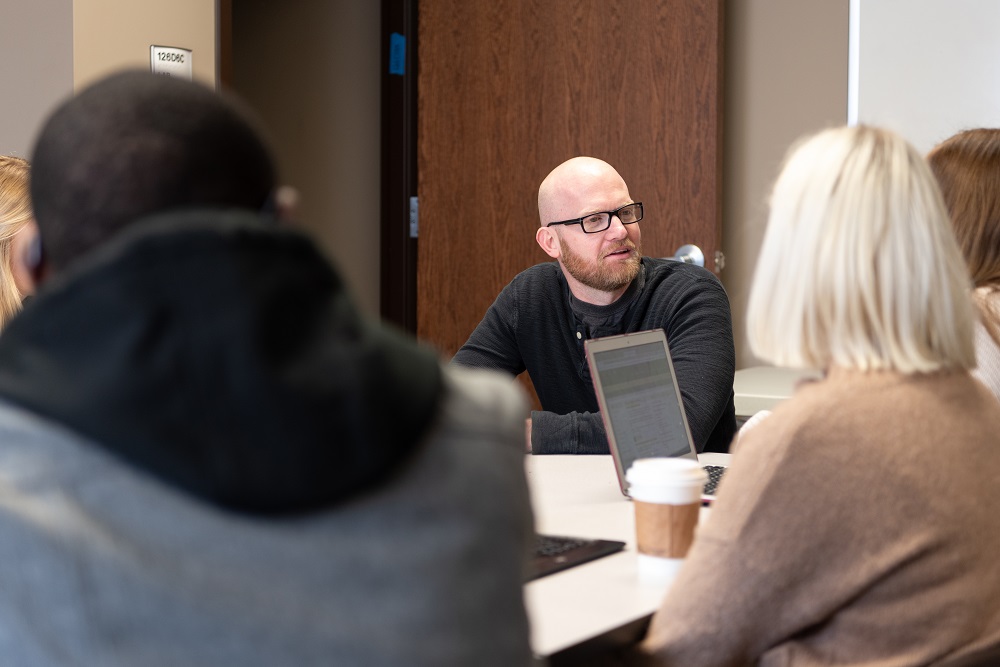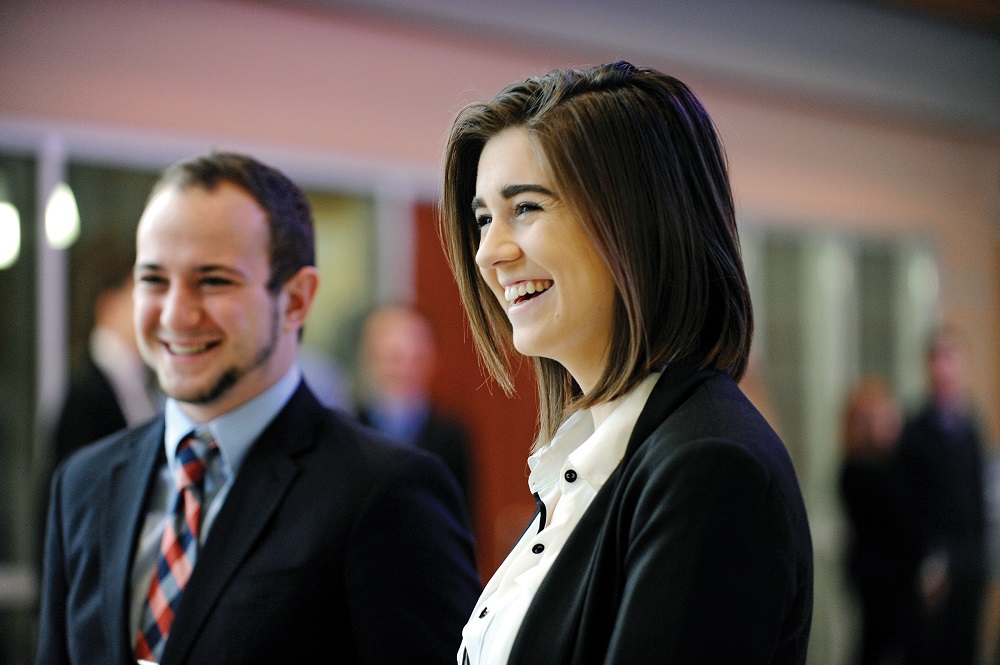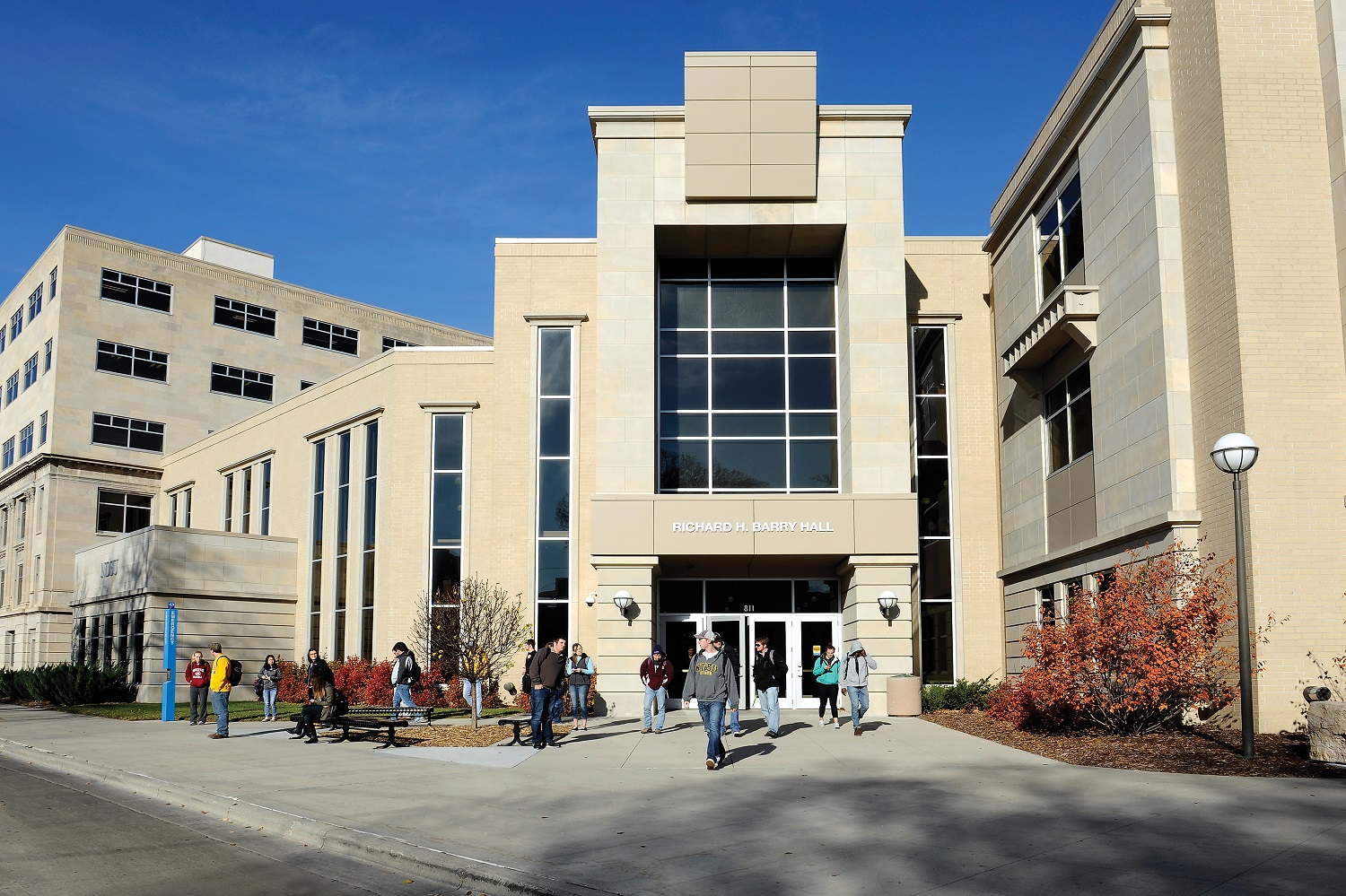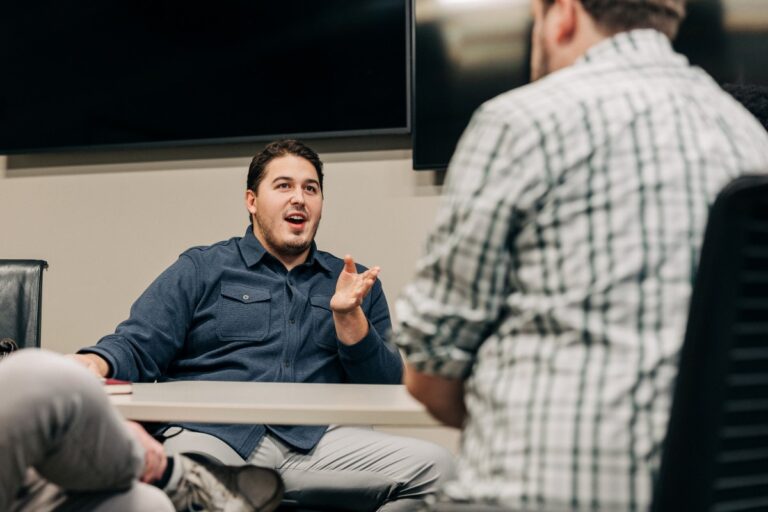At Marvin’s inaugural sales competition, NDSU students sharpen their skills in active listening, product knowledge, and persuasive communication.
Read MoreFinding Meaning Meets Main Street
Dr. Clay Routledge spent two decades researching meaning in life. Now, he's taking his research beyond the lab to improve communities.
Story by Nicole Thom-Arens | April 11, 2022

Many of us often consider our own happiness, but it’s rarer for us to consider whether our lives have meaning — the two, according to Dr. Clay Routledge, are not the same. Clay, the Arden and Donna Hetland Distinguished Professor of Business at NDSU, has spent his career studying meaning in life.
“It is wonderful that the world is generally getting richer. This means less poverty, less starvation and malnutrition, more education, better healthcare, more free time, and so on; however, civilizational progress creates unique challenges that we should care about in order to continue to advance progress. The more affluent a society is, the easier it is for people to become disconnected from each other and to doubt the meaningfulness of their lives,” Clay said. “People are trying to connect with something that makes a difference in other people’s lives. That’s one of the things that people often misunderstand about meaning. Meaning isn’t the same thing as pleasure. It doesn’t mean you’re happy all the time. Meaning is that feeling of significance and even transcendence that comes from making a difference in the world and in the lives of those you deeply care about.”
As a Challey Scholar in the Sheila and Robert Challey Institute for Global Innovation and Growth (Challey Institute), Clay’s goal is “to help individuals and organizations understand and apply psychological science to promote progress and flourishing.”
"One of the challenges we have in our culture is that there is such an emphasis on following your dream and doing stuff to fulfill individual passions. All of that's great, but I think sometimes what's lost is a message of, 'How do I serve others?'"
Dr. Clay Routledge
The Arden and Donna Hetland Distinguished Professor of Business
Clay spent 13 years teaching and conducting research in NDSU’s psychology department where he focused on the “basic science” of psychology and trying to understand how the mind works. In a laboratory setting, Clay asked people questions about the different cognitive processes involved in how they make meaning and what makes their lives meaningful. Becoming a Challey Scholar allowed Clay to take his 20 years of research and apply it to real world challenges and issues in order to help people.
“Most of my research is focused on how human beings grapple with big existential questions that result from our advanced cognitive capacities. We are uniquely able to reflect on the nature of existence and to seek meaning that transcends our individual mortality. We want to have an enduring impact and to feel like we are part of something that outlasts our brief time as physical organisms,” Clay said. “In the College of Business, I really apply those questions to the business community and more broadly to the economic world because a lot of the jobs people choose, the entrepreneurial goals people have, the pro-social behavior they engage in to give back to their communities, and many of their financial decisions are very much connected to their existential lives and the desire to find and maintain meaning.”
Meaning in life is certainly a nuanced concept, but there are commonalities across demographics.
“In general, the more people feel socially connected, the more likely they are to view their lives as meaningful,” Clay wrote in the May 2020 article, “Why Meaning Matters for Freedom and Flourishing.” Clay, who was born in Africa to missionary parents, encourages people to make an effort to form a connection to other people.

“Meaning is very social — turns out that’s the case around the world,” Clay said. “It really is that sense of mattering in a relationship and to a group. I suspect there’s an ancient explanation for this — like your value to the tribe and those who help you survive and thrive. You need to feel like you’re important to the functioning of the group and your family.”
As our societies progress and humans rely less and less on each other — especially in highly individualistic cultures like in the U.S. — there can be a loss of meaning, and that’s a problem for us all because meaning is critical for mental and physical health.
“If someone is pessimistic, if they don’t feel like they have any control over their life, if they don’t regulate their behavior appropriately, then all those external resources aren’t going to help them thrive,” Clay said. “I’m interested in that piece — the internal resources piece. How do we cultivate a society that helps individuals not only with external supports but also with their ability to marshal their own resources toward goals?”
Work can promote meaning in life by helping people support themselves and their families. One of Clay’s studies found income was significantly related to meaning only to the point of economic security. This is where Clay’s research aligns with the College of Business. Healthy economies need healthy workers and innovation requires people with resilience, self-control, persistence, optimism, and problem solving.
“I’m interested in what benefits people, what helps people flourish. That’s going to help businesses flourish and society flourish,” Clay said. “There’s an intimate connection between individuals and the business world and the broader organizational world. We need functioning government, we need functioning businesses, we need ethical government, ethical businesses, and other types of organizations. I’m really interested in these human needs, particularly how meaning in life is channeled into these different spheres including the business world.”
One of the pillars of the Challey Institute is to create economic opportunity in the upper Midwest. Clay came to the Institute with extensive scholarly experience and has been incredibly influential in its progression.
“Clay brought us research excellence,” Scott Beaulier, Ronald and Kaye Olson Dean of the College of Business, said. “Clay is someone many of our junior faculty in the College look up to. He is extremely impactful. He’s highly cited; he may go down in the history of NDSU as the most cited professor we’ve ever had. He’s young and on an amazing trajectory. We are thrilled to have someone like Clay in our college.”
Another pillar of the Challey Institute is entrepreneurship and innovation.
“We’re trying to help people get rid of barriers that deprive them of being the best versions of themselves,” Scott said. “Clay’s work intersects with this focus area in that finding meaning in life is far more difficult when countless obstacles are thrown in your way.”

Identifying barriers to success involves exploring the age-old question of nature versus nurture. Each of us is wired differently, but research shows our environment can influence some of our psychological traits. An area of continued growth in the College of Business is creating an environment of entrepreneurship, that helps nurture skills that lead to success. The mission of the Center for Entrepreneurship and Family Business (formerly called the Nice Center) is to reach every NDSU student because the lessons of entrepreneurship exceed the parameters of startups and the fundamentals of running a business.
“Entrepreneurs have high failure rates, so they require a lot of resilience, a lot of persistence,” Clay said. “If you think about these psychology traits, they are good for anyone in business and in life more generally.”
Teaching those skills is possible. We don’t have to be born entrepreneurs. We can learn to be entrepreneurs and in doing so, strengthen the psychological traits that lead to greater meaning in life; however, many struggle to connect their work with meaning.
“One of the challenges we have in our culture is that there is such an emphasis on following your dream and doing stuff to fulfill individual passions. All of that’s great, but I think sometimes what’s lost is a message of, ‘How do I serve others?'” Clay said. “Jobs can be great sources of meaning, especially if people are using the job to help others in some way, but it is also important to remember that a lot of the labor people do that’s meaningful to them isn’t paid. It’s taking care of people and helping people. If you honestly think what you’re doing is in no way contributing, then find some space to do something that’s serving other people.”
Share This Story
Related Stories
The Gift of Possibility
Entrepreneurial NDSU students are getting hands-on experience in the local business ecosystem in a brand-new entrepreneurship fellowship program.
Read More
